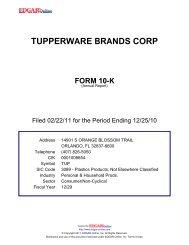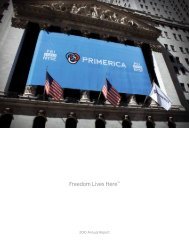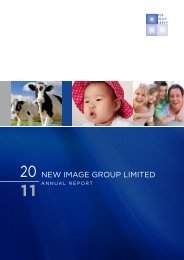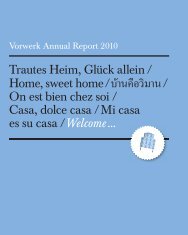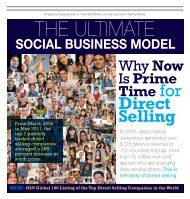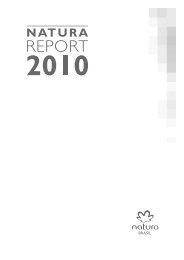Nu Skin 2010 Annual Report - Direct Selling News
Nu Skin 2010 Annual Report - Direct Selling News
Nu Skin 2010 Annual Report - Direct Selling News
Create successful ePaper yourself
Turn your PDF publications into a flip-book with our unique Google optimized e-Paper software.
Manufacturing Facilities. Each of our manufacturing facilities<br />
measure 30,000 square feet or more, and include the following:<br />
• our nutritional supplement manufacturing facility in Zhejiang<br />
Province, China;<br />
• our personal care manufacturing facility in Shanghai, China;<br />
• our Vitameal manufacturing facility in Jixi, Heilongjiang Province;<br />
• our herbal extraction facility in Zhejiang Province.<br />
Retail Stores. As of December 31, <strong>2010</strong>, we operated 40 stores<br />
throughout China.<br />
Research and Development Centers. We operate three research<br />
and development centers, one in Provo, Utah, one in Shanghai,<br />
China, and one in Beijing, China. We are currently in the design<br />
phase of building a state-of-the-art innovation center adjacent to our<br />
corporate headquarters. We believe this facility will cost approximately<br />
$85 million and will take roughly two years to complete.<br />
We own our corporate headquarters buildings, distribution center<br />
and research and development center located in Provo, Utah. We<br />
also own our nutritional supplement plant in China, and a few other<br />
minor facilities. We currently lease the other properties described<br />
above. We believe that our existing and planned facilities are adequate<br />
for our current operations in each of our existing markets.<br />
ITEM 3.<br />
LEGAL PROCEEDINGS<br />
Due to the international nature of our business, we are subject from<br />
time to time to reviews and audits by the foreign taxing authorities of<br />
the various jurisdictions in which we conduct business throughout the<br />
world. We are currently involved in two separate disputes with the customs<br />
authorities in Japan with respect to duty assessments on several<br />
of our Pharmanex nutritional products totaling approximately 5.3 billion<br />
Japanese yen as of December 31, <strong>2010</strong> (approximately $65.3 million),<br />
net of any recovery of consumption taxes. We also recently were notified<br />
that we are likely to receive an additional assessment of 0.6 billion Japanese<br />
yen (approximately $7.7 million) related to the second dispute.<br />
The first dispute relates to additional customs assessments made<br />
by Yokohama Customs for the period of October 2002 through July<br />
2005. The aggregate amount of these additional assessments is 2.7<br />
billion Japanese yen (approximately $33.2 million as of December 31,<br />
<strong>2010</strong>), net of any recovery of consumption taxes. The dispute relates to<br />
whether we used the proper valuation method for these products in<br />
determining the applicable customs duties. The primary legal issue in<br />
the case is whether the relevant import transaction is a sale between<br />
our third party manufacturers and our Japan subsidiary, or a sale between<br />
our US subsidiary and our Japan subsidiary. In 1999, we worked with the<br />
Yokohama Customs authorities to restructure the form of the relevant<br />
transactions in order to have the import transaction be a sale between<br />
our third party manufacturers and our Japan subsidiary, and thus have<br />
the duties assessed on the price paid to our third party manufacturers.<br />
With the input and guidance of the Yokohama Customs authorities, we<br />
restructured the form of the transaction and the agreements between<br />
the relevant parties based on these discussions so that our US subsidiary<br />
would be acting on behalf of our Japan subsidiary with respect to the<br />
purchase of these products rather than as a buyer/seller. Our Japan<br />
subsidiary entered into a Memorandum of Understanding with each of<br />
our third party manufacturers of the relevant products, which provided<br />
that our Japan subsidiary was the purchaser of the products and that<br />
our US subsidiary was acting for and on behalf of our Japan subsidiary<br />
with respect to these products. Our Japan subsidiary also entered into<br />
a Memorandum of Understanding with our US subsidiary documenting<br />
the same agency relationship. We believe that these legal documents<br />
establish that our US subsidiary was acting as an agent and not buyer<br />
and seller of the relevant products. The additional assessment of duties<br />
by Yokohama Customs was based on its re-characterization of the<br />
transaction as a sale between our US subsidiary and our Japan subsidiary<br />
for custom law purposes despite the legal form of the transaction.<br />
We do not believe the legal documentation supports the re-characterization<br />
of these transactions. Yokohama Customs has raised several<br />
issues to support its re-characterization, including the fact that we have<br />
treated the relevant transaction as a sale between our US subsidiary<br />
and Japan subsidiary for income tax purposes. However, we believe that<br />
the relevant income tax and transfer pricing rules and regulations apply<br />
different standards and are not relevant to the customs issue. Because<br />
we believe that the legal documentation for these transactions support<br />
our position, we filed a complaint in the Tokyo District Court Civil Action<br />
Section in December 2006 to have the Ministry of Finance’s affirmation<br />
of the additional assessments reversed. The final hearing on<br />
this matter was held on February 1, 2011 and the court indicated it would<br />
issue a decision on this case on March 25, 2011. Either party has the right<br />
to appeal this decision. If we receive an adverse decision in this case, we<br />
may be required to record an expense for the full amount of the disputed<br />
assessments, or $33.2 million.<br />
The second dispute relates to additional customs assessments made<br />
by Yokohama Customs for the period of October 2006 through November<br />
2008 in connection with an audit in 2009, as well as the disputed<br />
portion of our current import duty rate we have been required to<br />
pay or hold in bond, and have paid under protest, since October of 2009.<br />
The aggregate amount of these additional assessments and disputed<br />
duties is 2.6 billion Japanese yen as of December 31, <strong>2010</strong> (approximately<br />
$32.1 million), net of any recovery of consumption taxes. We were<br />
also recently notified that we are likely to be assessed an additional 0.6<br />
billion Japanese yen (approximately $7.7 million), net of any recovery of<br />
30



